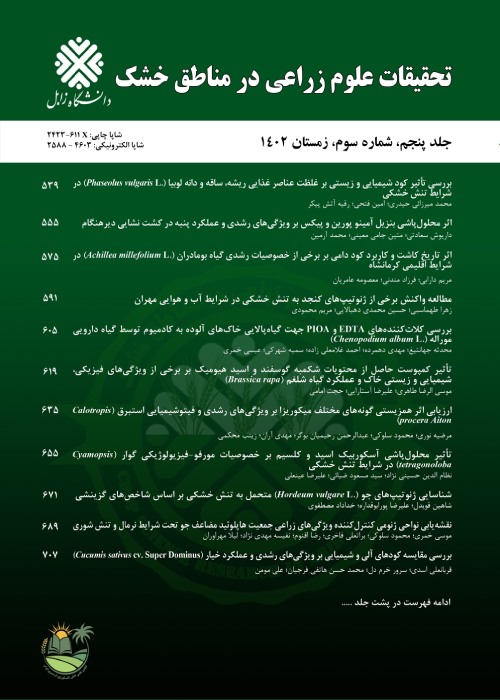Effect of herbicide Haloxifhop-R-methyl application and foxtail weed on quantitative and qualitative yield of peanut
Peanut (Arachis hypogaea L.) is one of the most valuable and economically significant oilseeds in tropical and subtropical regions, primarily grown for its oil, protein, and carbohydrates. The peanut is a summer-growing, South American legume that is well-adapted to the warmer regions of Australia. If conditions permit, it can behave as a perennial and live for multiple years. Peanuts, like other legumes, do not rely on soluble nitrogen in the soil to meet their nitrogen needs. Contrary to other legumes, this plant grows underground and has four leaflets per leaf instead of three. Typically, peanut pods consist of an outer shell containing two kernels. It is an annual plant belonging to the Leguminosae family and the Arachis genus, with a straight main root.The peanut seed contains 43-55% oil and 25-28% protein and is rich in edible oil. Providing peanuts with nutrients in a typical manner is essential for maximizing agricultural yield. From the time of pollination until two weeks prior to harvest, peanuts will need irrigation. Lack of proper management of herbicide use and weed density is a significant factor in the reduction of peanut yield in the province of Guilan. In addition to reducing harmful environmental effects, the effective use of herbicides can provide the desired weed control at a lower cost to the region's farmers. The purpose of this study was to determine the impact of the herbicide R-methyl haloxyfop and the density of foxtail weeds on the yield and agricultural characteristics of peanuts in the study area.
This research was conducted in 2017 and 2018 in Astaneh Ashrafiyeh city.In terms of climate, this region was one of the temperate and humid regions. The experiment was conducted over the course of two years using a split-plot design in the form of a randomized complete block design with three replications in the field. The experiment has the main factor of the amount (dose) of the herbicide haloxyfop R-methyl in 6 spraying levels with doses of 0, 0.1, 0.2, 0.4, 0.8 and 1.6 L/ha the effective ingredient and secondary factor of foxtail weed density in five planting densities was including 0, 60, 120, 180 and 250 plants per square meter. Goli, a local, large-seeded cultivar and the dominant cultivar in the region, was utilized.
The evaluation of the model revealed that, at a level of 5%, the interaction effect of herbicide concentration and plant density was significant on biological yield, pods, and seeds. At a concentration of 0.4 L/ha and a density of 60 plants per square meter, an average seed yield of 2,798 Kg/ha was observed. With an average of 78.5% fruiting and 109.4 g/m2/day, the highest fruiting percentage and crop growth rate were obtained at a concentration of 0.4 L/ha and the density of the control plant. The highest seed weight and specific leaf area averaged 86,3 and 157,6 g/m2 at concentrations of 0.4 and 1.6 L/ha, respectively. At a density of 60 plants/m2, the highest levels of seed oil and leaf surface index were observed, with 24% and 3.9%, respectively.
The results demonstrated that the interference of weeds with peanut plants decreases the leaf area index and the level of its field distribution. The herbicide haloxyfop R-methyl can significantly reduce weeds in peanut fields and improve conditions for the plant's growth. According to research findings and taking into account peanut yield, the optimal management for herbicide consumption and plant density is 0.4 liters/ha for weed-free plants and 60 plants/m2for the entire area is recommended.
- حق عضویت دریافتی صرف حمایت از نشریات عضو و نگهداری، تکمیل و توسعه مگیران میشود.
- پرداخت حق اشتراک و دانلود مقالات اجازه بازنشر آن در سایر رسانههای چاپی و دیجیتال را به کاربر نمیدهد.


